三上英语句子单
- 格式:doc
- 大小:141.00 KB
- 文档页数:57
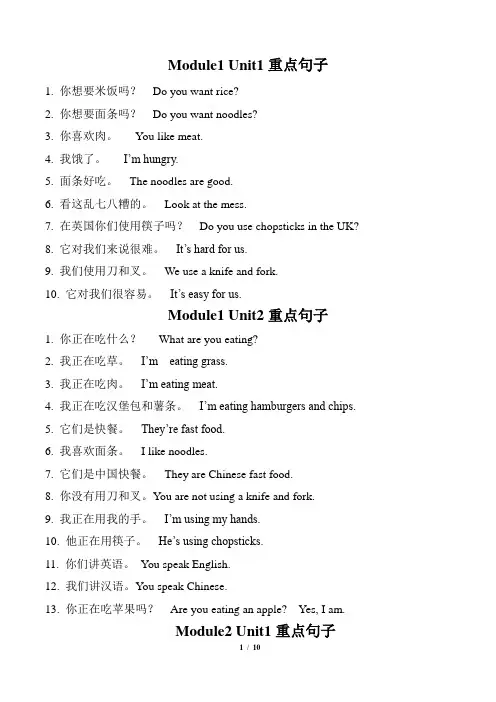
Module1 Unit1重点句子1. 你想要米饭吗?Do you want rice?2. 你想要面条吗?Do you want noodles?3. 你喜欢肉。
You like meat.4. 我饿了。
I’m hungry.5. 面条好吃。
The noodles are good.6. 看这乱七八糟的。
Look at the mess.7. 在英国你们使用筷子吗?Do you use chopsticks in the UK?8. 它对我们来说很难。
It’s hard for us.9. 我们使用刀和叉。
We use a knife and fork.10. 它对我们很容易。
It’s easy for us.Module1 Unit2重点句子1. 你正在吃什么?What are you eating?2. 我正在吃草。
I’m eating grass.3. 我正在吃肉。
I’m eating meat.4. 我正在吃汉堡包和薯条。
I’m eating hamburgers and chips.5. 它们是快餐。
They’re fast food.6. 我喜欢面条。
I like noodles.7. 它们是中国快餐。
They are Chinese fast food.8. 你没有用刀和叉。
You are not using a knife and fork.9. 我正在用我的手。
I’m using my hands.10. 他正在用筷子。
He’s using chopsticks.11. 你们讲英语。
You speak English.12. 我们讲汉语。
You speak Chinese.13. 你正在吃苹果吗?Are you eating an apple? Yes, I am.Module2 Unit1重点句子1. 你正在做什么?What are you doing?2. 我正在骑自行车。
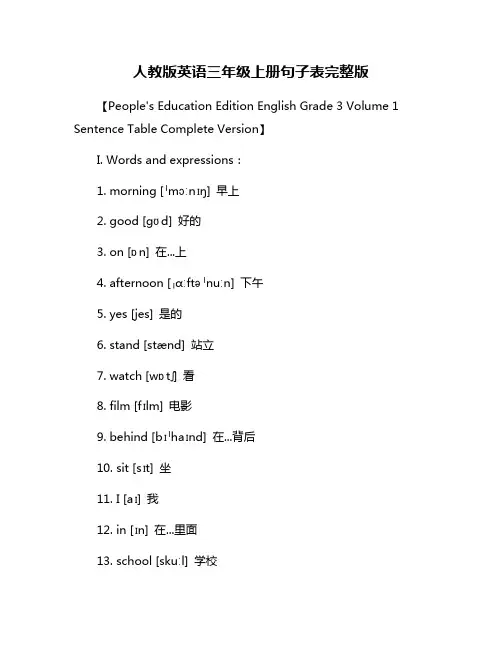
人教版英语三年级上册句子表完整版【People's Education Edition English Grade 3 Volume 1 Sentence Table Complete Version】I. Words and expressions:1. morning [ˈmɔːnɪŋ] 早上2. good [ɡʊd] 好的3. on [ɒn] 在...上4. afternoon [ˌɑːftəˈnuːn] 下午5. yes [jes] 是的6. stand [stænd] 站立7. watch [wɒtʃ] 看8. film [fɪlm] 电影9. behind [bɪˈhaɪnd] 在...背后10. sit [sɪt] 坐11. I [aɪ] 我12. in [ɪn] 在...里面13. school [skuːl] 学校14. is [ɪz] 是15. go [ɡəʊ] 去16. to [tuː] 到...去17. morning [ˈmɔːnɪŋ] 早上18. teacher [ˈtiːtʃə] 教师19. the [ðə] 这个20. with wɪð] 与...一起21. we [wiː] 我们22. have [hæv] 有23. math [mæθ] 数学24. class [klɑːs] 课25. a [ə] 一26. lesson [ˈlesn] 课27. English [ˈɪŋɡlɪʃ] 英语28. they [ðeɪ] 他们29. music [ˈmjuːzɪk] 音乐30. P.E. [ˌpiːˈiː] 体育II. Sentences and dialogues:1. Good morning, children. 早上好,孩子们。
2. Good morning, Miss Li. 早上好,李老师。
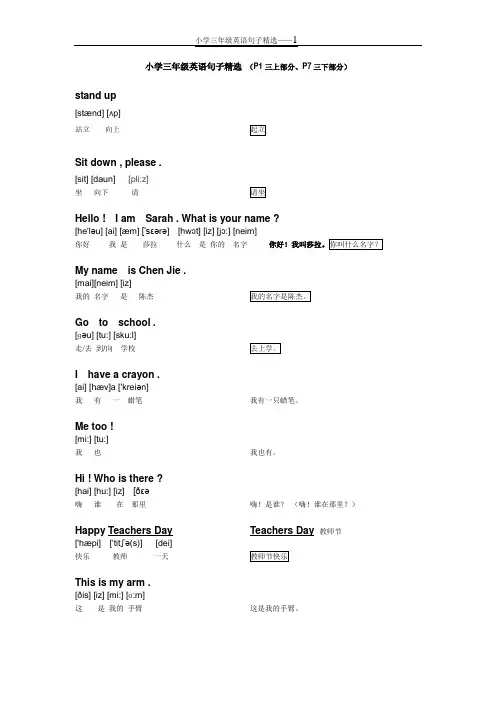
小学三年级英语句子精选(P1三上部分、P7三下部分)stand up[stænd] [ʌp]站立向上Sit down , please .[sit] [daun] [pli:z]坐向下请Hello ! I am Sarah . What is your name ?[he'ləu] [ai] [æm] ['sεərə] [hwɔt] [iz] [jɔ:] [neim]你好我是莎拉什么是你的名字My name is Chen Jie .[mai][neim] [iz]我的名字是陈杰Go to school .[ɡəu] [tu:] [sku:l]走/去到/向学校I have a crayon .[ai] [hæv]a ['kreiən]我有一蜡笔我有一只蜡笔。
Me too ![mi:] [tu:]我也我也有。
Hi ! Who is there ?[hai] [hu:] [iz] [ðεə嗨谁在那里嗨!是谁?(嗨!谁在那里?)Happy Teachers Day Teachers Day 教师节['hæpi] ['titʃə(s)] [dei]快乐教师一天This is my arm .[ðis] [iz] [mi:] [ɑ:m]这是我的手臂这是我的手臂。
head头[hed] face脸[feis] nose鼻子[nəuz] mouth嘴[mauθ] eye眼睛[ai] ear耳朵[iə] arm手臂[ɑ:m] hand手[hænd] finger手指['fiŋɡə] Toes脚趾[təu(s)] foot脚[fut] leg腿[leɡ] Shoulders肩膀['ʃəuldə(z)] Hip臀部[hip] Knees膝盖[niː] body身体['bɔdi]Here it is ![hiə] [it] [iz]这里它在它在这里!Nice to meet you .[nais] [tu:] [mi:t] [ju:]高兴到/向遇见你Nice to meet you , too .[nais] [tu:] [mi:t] [ju:] [tu:]高兴向/到遇见你也Good morning .[ɡud] ['mɔ:niŋ]好早晨/上午Good afternoon .[ɡud] [,ɑ:ftə:'nu:n]好的下午Who are you ?[hu:] [ɑ:] [ju:]谁是你How are you ?[hau] [ɑ:] [ju:]如何是你Fine , thank you . How are you ?[fain] [θæŋk] [ju:] [hau] [ɑ:] [ju:]好的谢谢你如何是你(我)很好,谢谢你,你好吗?Very well , thanks .['veri] [wel] [θæŋk(s)]很健康的谢谢我很好,谢谢。
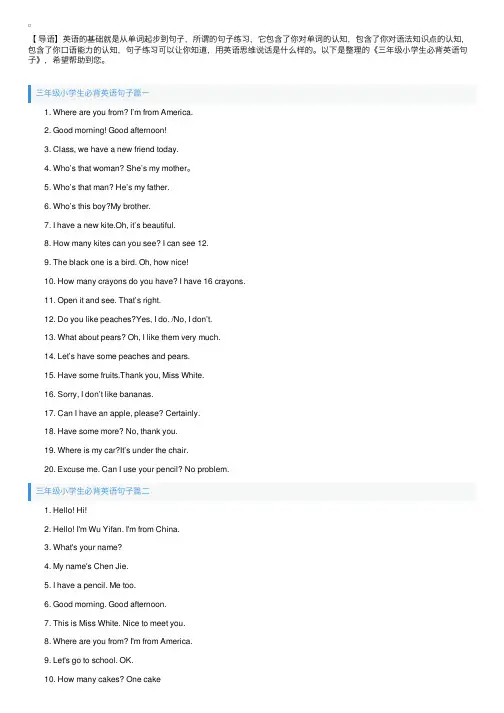
【导语】英语的基础就是从单词起步到句⼦,所谓的句⼦练习,它包含了你对单词的认知,包含了你对语法知识点的认知,包含了你⼝语能⼒的认知,句⼦练习可以让你知道,⽤英语思维说话是什么样的。
以下是整理的《三年级⼩学⽣必背英语句⼦》,希望帮助到您。
三年级⼩学⽣必背英语句⼦篇⼀ 1. Where are you from? I’m from America. 2. Good morning! Good afternoon! 3. Class, we have a new friend today. 4. Who’s that woman? She’s my mother。
5. Who’s that man? He’s my father. 6. Who’s this boy?My brother. 7. I have a new kite.Oh, it’s beautiful. 8. How many kites can you see? I can see 12. 9. The black one is a bird. Oh, how nice! 10. How many crayons do you have? I have 16 crayons. 11. Open it and see. That’s right. 12. Do you like peaches?Yes, I do. /No, I don’t. 13. What about pears? Oh, I like them very much. 14. Let’s have some peaches and pears. 15. Have some fruits.Thank you, Miss White. 16. Sorry, I don’t like bananas. 17. Can I have an apple, please? Certainly. 18. Have some more? No, thank you. 19. Where is my car?It’s under the chair. 20. Excuse me. Can I use your pencil? No problem.三年级⼩学⽣必背英语句⼦篇⼆ 1. Hello! Hi! 2. Hello! I'm Wu Yifan. I'm from China. 3. What's your name? 4. My name's Chen Jie. 5. I have a pencil. Me too. 6. Good morning. Good afternoon. 7. This is Miss White. Nice to meet you. 8. Where are you from? I'm from America. 9. Let's go to school. OK. 10. How many cakes? One cake 11. How are you? I'm fine, thank you. 12. Let's paint. Great 13. I like green. Me too. 14. I have a rabbit. 15. Cool! Super! Great! Wow! 16. May I have a look? Sure. 17. Here you are. Thank you. You're welcome 18. I like hamburgers. Me too 19. Have some French fries. 20. Can I have some chicken? Sure.三年级⼩学⽣必背英语句⼦篇三 1. Here you are. Thank you! 2. Come on, children. Look at the elephant. 3. Wow! It’s so big!It’s so funny! 4. It has a long nose and a short tail. 5. It has small eyes and big ears. 6. Look at the giraffe.Oh, it’s so tall. 7. The giraffe is tall. The deer is short. 8. You’re tall. I’m short.You’re right. 9. Let’s fly it. OK. 10. What a big fish! 11. How old are you? I'm nine. 12.Clap your hands. 13.Very well,thanks. 14.Look at me! 15.Look at my nose! 16.Let’s go to school! 17.This is my face. 18.Close your eyes. 19.Open your mouth. 20.Touch your nose.。
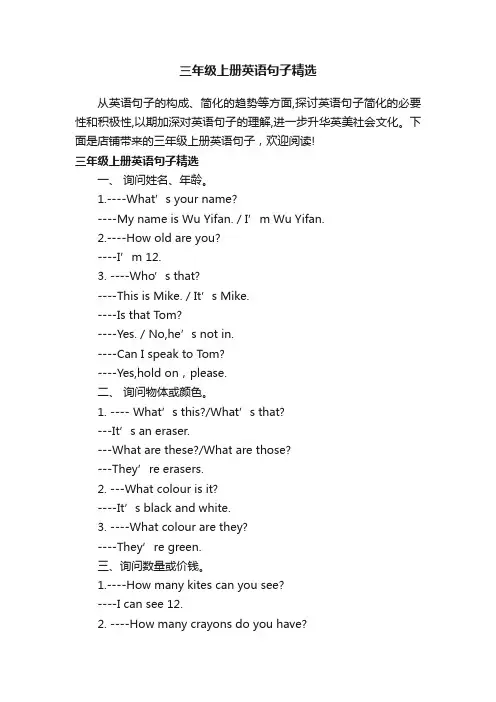
三年级上册英语句子精选从英语句子的构成、简化的趋势等方面,探讨英语句子简化的必要性和积极性,以期加深对英语句子的理解,进一步升华英美社会文化。
下面是店铺带来的三年级上册英语句子,欢迎阅读!三年级上册英语句子精选一、询问姓名、年龄。
1.----What’s your name?----My name is Wu Yifan. / I’m Wu Yifan.2.----How old are you?----I’m 12.3. ----Who’s that?----This is Mike. / It’s Mike.----Is that Tom?----Yes. / No,he’s not in.----Can I speak to Tom?----Yes,hold on,please.二、询问物体或颜色。
1. ---- What’s this?/What’s that?---It’s an eraser.---What are these?/What are those?---They’re erasers.2. ---What colour is it?----It’s black and white.3. ----What colour are they?----They’re green.三、询问数量或价钱。
1.----How many kites can you see?----I can see 12.2. ----How many crayons do you have?----I have 16.3. ----How many people are there in your family? ----Three.4. ----How much is this dress?----It’s ninety-nine yuan.5. ----How much are these apples?----They’re thirty-five yuan.三年级上册英语句子阅读询问时间或日期。
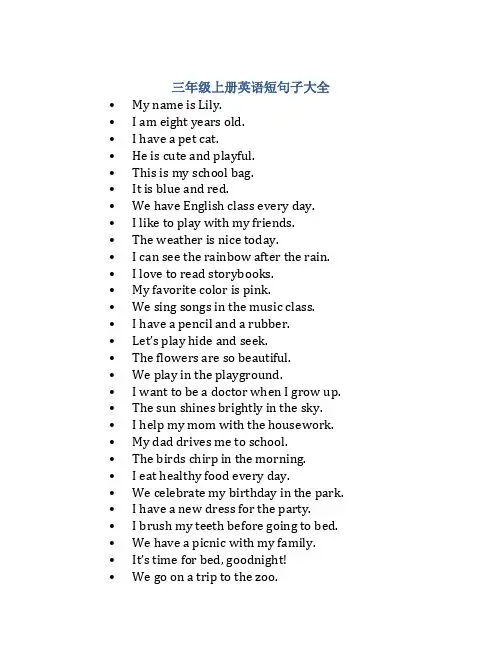
三年级上册英语短句子大全•My name is Lily.•I am eight years old.•I have a pet cat.•He is cute and playful.•This is my school bag.•It is blue and red.•We have English class every day.•I like to play with my friends.•The weather is nice today.•I can see the rainbow after the rain.•I love to read storybooks.•My favorite color is pink.•We sing songs in the music class.•I have a pencil and a rubber.•Let’s play hide and seek.•The flowers are so beautiful.•We play in the playground.•I want to be a doctor when I grow up.•The sun shines brightly in the sky.•I help my mom with the housework.•My dad drives me to school.•The birds chirp in the morning.•I eat healthy food every day.•We celebrate my birthday in the park.•I have a new dress for the party.•I brush my teeth before going to bed.•We have a picnic with my family.•It’s time for bed, goodnight!•We go on a trip to the zoo.•I like to draw pictures in my notebook.•We have a spelling test on Friday.•I play soccer with my friends.•I listen to the teacher in class.•The teacher gives us homework.•I learn new words every day.•We have a math quiz today.•I visit my grandparents on weekends.•We watch a movie together.•I ride my bike in the park.•We have a school assembly.•I make a card for my friend.•We have a talent show at school.•I plant flowers in the garden.•The moon is so big and bright.•I take a bath before going to school.•We have a science experiment in class.•I eat fruits and vegetables for snacks.。
三年级上册知识点汇总Unit1Hello!I'mWuYifan你好,我是吴一凡。
Hi,I'mSarah你好,我是萨拉。
What'syourname?你叫什么名字?Myname'sJohn我的名字叫约翰。
Ihavearuler.我有一把尺子。
Metoo!我也是!Ihaveaneraser.我有一块橡皮.Metoo!我也是!Goodbye!再见!Bye,MissWhite.再见,怀特小姐。
Showmeyourpen.让我看看你的钢笔。
Openyourpencil--case.打开你的铅笔盒。
Closeyourbook.合上你的书。
Carryyourbag.背起你的书包。
Unit2Mr.Jones,thisisMissGreen.琼斯先生,这是格林小姐。
Goodmorning,MissGreen早上好,格林小姐。
Nicetomeetyou.很高兴认识你。
Nicetomeetyou,too.见到你也很高兴。
Iseered.我看见红色。
Goodafternoon,WuYifan.下午好,吴一凡。
Goodafternoon.下午好。
Black,black.Standup.黑色,黑色,站起来(起立)!橙色,橙色,坐下!白色,白色,摸摸地棕色,棕色,转身。
Colouritbrown!把它涂成棕色。
OK.好。
Showmegreen.让我看看绿色。
Showmered.让我看看红色。
Showmeyellow.让我看看黄色。
Showmeblue.让我看看蓝色。
Orange,orange.Sitdown. White,white,Touchtheground Brown,brown.Turnaround.Unit3Howareyou?你好吗?I'mfine,thankyou.我很好,谢谢Let'sgotoschool.让我们一起去学校吧。
OK.好。
Lookatme.看看我。
三一文库()/小学三年级〔三年级小学生英语优质句子摘抄〕【篇一】1、常问自己,谁对我有恩还没加倍报答。
Often ask yourself, who have grace to me not to double repay.2、成熟,是一个男人令一个女人意乱情迷的首要因素!Mature, is a man to a woman's primary factor yiluanqingmi!3、把痛苦停在昨天把微笑留给明天。
Stop the pain and leave the smile to tomorrow.4、天才是百分之一的灵感加上百分之九十九的努力。
Genius is one percent inspiration and ninety-nine percent effort.5、三军可夺帅也,匹夫不可夺志也。
An army may be deprived of, man can not be deprived.6、人生就像一杯茶,不会苦一辈子,但总会苦一阵子。
Life is like a cup of tea, not bitter life, but always hard for a while.7、任何的限制,都是从自己的内心开始的。
Any restrictions, are from his heart began.8、不以规矩,无以成方园。
No rules, no square garden.9、长风破浪会有时,直挂云帆济沧海。
I will mount a long wind some day and break the heavy waves, and set my cloudy sail straight and bridge the deep, deep sea。
10、流过泪的眼睛更明亮,滴过血的心灵更坚强!The tears that flow through the eyes are brighter and the heart is stronger!1、你不能左右天气,但你可以改变心情。
英语超短句子摘抄三年级英语学习在小学阶段就显得尤为重要,它是一门必修课程,也是一种基础技能。
在三年级,学生开始学习更多的基础词汇和句子,通过摘抄英语超短句子可以帮助他们提升英语表达能力,同时培养他们对英语的兴趣。
以下是一些适合三年级学生的英语超短句子摘抄。
1. Greetings(问候)•Good morning! 早上好!•How are you? 你好吗?•Nice to meet you! 很高兴见到你!•Hello! 哈喽!2. Family(家庭)•I love my family. 我爱我的家人。
•My mom is pretty. 我妈妈很漂亮。
•I have a big brother. 我有一个大哥哥。
•This is my dad. 这是我的爸爸。
3. School(学校)•I go to school every day. 我每天去学校。
•My teacher is nice. 我的老师人很好。
•I like to read books. 我喜欢看书。
•We play games at recess. 我们在课间休息玩游戏。
4. Animals(动物)•I have a pet cat. 我有一只宠物猫。
•The dog is running. 狗在跑步。
•Birds can fly. 鸟儿会飞。
•I like dolphins. 我喜欢海豚。
5. Numbers(数字)•One, two, three… 一、二、三……•Ten plus five is fifteen. 十加五等于十五。
•How many apples do you have? 你有多少个苹果?•I can count to twenty. 我会数到二十。
6. Colors(颜色)•Red is my favorite color. 红色是我最喜欢的颜色。
•The sky is blue. 天空是蓝色的。
三年级上册单词及句子(pep)Unit 1单词:what 什么is 是name名字ruler 尺子pencil 铅笔eraser 橡皮crayon 蜡笔bag包pen 钢笔pencil box 铅笔盒book 书no 不your 你(们)的句子:Hello, I’m Wu Yifan. 你好,我是吴一凡。
Hi, I’m Sarah. 你好,我是萨拉。
I have a ruler/an eraser. 我有一把尺子/一块橡皮。
What’s you r name? 你叫什么名字<My name’s John. 我叫约翰。
Goodbye! 再见=Bye, Miss White. 再见,怀特小姐。
Unit 2单词:red 红色;红色的green 绿色;绿色的yellow 黄色;黄色的blue 蓝色;蓝色的black 黑色;黑色的brown 棕色;棕色的white 白色;白色的orange 橙色;橙色的OK 好;行mum 妈妈句子:Mr Jones, this is Miss Green. 琼斯先生,这是格林小姐。
Good morning, Miss Green. 早上好,格林小姐。
I see red. 我看见红色。
Good afternoon, Wu Yifan. 下午好,吴一凡。
Nice to meet you. 见到你很高兴。
Nice to meet you, too.见到你也很高兴。
Colour it brown! 把它涂成棕色吧=Unit 3单词:face 脸ear 耳朵eye 眼睛nose 鼻子mouth 嘴arm 胳膊hand 手head 头body 身体leg 腿foot 脚school 学校句子:How are you? 你好吗<I’m fine, thank you. 我很好,谢谢你。
Let’s go to school! 我们一起上学吧=Look at me! 看我=Very well, thanks. 很好,谢谢。
Let’s make a puppet! (让)我们一起做个木偶吧=Great! 太棒了=Unit 4单词:duck 鸭子pig 猪cat 猫bear 熊dog 狗elephant 大象monkey 猴子bird 鸟tiger 老虎panda 大熊猫zoo 动物园funny 滑稽的;好笑的句子:What’s this? 这是什么<It’s a duck. (它)是只鸭子。
What’s that? 那是什么<Cool! I like it. 酷=我喜欢它。
Unit 5单词:bread 面包juice 果汁egg 蛋milk 牛奶water 水cake 蛋糕fish 鱼rice 米饭句子:I’d like some juice, please. 请给我些果汁。
Here you are. 给你。
Have some bread. 吃点面包吧。
I’m hungry! 我饿了=Can I have some water, please? 请给我些水好吗<You’re welcome. 不用谢。
Unit 6单词:one 一two 二three 三four 四five 五six 六seven 七eight 八nine 九ten 十brother 兄;弟plate 盘子句子:This one, please. 请给我这个。
Sure. 好的。
How many plates? (你要)几个盘子<Happy birthday! 生日快乐=How old are you? 你几岁(了)<I’m six years old. 我六岁(了)。
二.***牢记下面的对话,会让你的英语说得更好!更棒!1、向别人问好应该说――A: Hello! (你好!)B: Hi! (你好!)2、问别人的名字应该说-――A:What’s your name?你的名字是什么?B:My name’s Chen Jie. 我的名字是陈洁。
3、跟别人分手应该说――A: Bye.\ Good bye!(再见)B: See you.(再见) \ Goodbye.(再见)4、A: I have a pencil\ bag\ruler. 我有一只铅笔\书包\尺子。
B: Me too . 我也有。
5、早上相见应该说-――A: Good morning. 早上好!B: Good morning! 早上好!6、下午相见应该说――A: Good afternoon! 下午好!B: Good afternoon! 下午好!7、跟新朋友第一次见面――A: Nice to meet you! 见到你很高兴。
B: Nice to meet you,too! 见到你也很高兴!8、A: Let’s go to school! 让我们一起去上学!B: OK! 好的。
9、看见久未见面的朋友或者别人身体不舒服,你该这么打招呼-A: How are you ? 你好吗?B: Fine,thank you我很好,谢谢你。
B:Very well, thanks.我非常好,多谢。
10、A: Let’s paint. 让我们一起画画吧。
B: Great! 棒极了!11、请别人吃东西,你该这么说―A: Have some bread. 吃一些面包。
B: Thank you.\ No, thanks. 谢谢你。
\不,谢谢你。
15、你想吃点东西,你该说――A: Can I have some juice?我能喝一些果汁吗?B: Sure,here you are. 当然可以,给你。
16、表达谢意时可说—A:Thank you. 谢谢你。
B: You're welcome. 别客气。
17、朋友生日时,你应说——A:Happy birthday. 生日快乐!B: Thank you. 谢谢。
18、问别人年龄时,可说---A: How old are you? 你几岁啦?B: I’m nine years old.或者I’m nine. 我九岁了。
(要用I’m加数字回答哦!)19、A: Let's eat the birthday cake. 让我们吃生日蛋糕吧。
B: Great! 棒极了!20、问某样东西的数量时,可说---A: How many plates\ cakes? 多少个盘子\礼物?(how many+可数名词复数)B: Four \ ten. 四/十。
(要用数字回答哦!)21、介绍朋友给其他人认识,应该说---A: This is Mr Jones. 这是琼斯先生。
B:Nice to meet you. 很高兴见到你。
22、要别人给某样东西上颜色可以说---A:Colour it brown/red/... 给它上棕色/红色….B:OK. 好的23、请别人一起制作木偶,可以说---A:Let ’s make a puppet! 让我们一起制作木偶吧。
B:Great / OK /Good idea. 好极了/ 好的/ 好主意。
24、问别人这是什么东西时,可说A:What’s this ? 这是什么?B:It’s a duck / dog /…. 它是一只鸭子/ 狗/….25、问别人那是什么东西时,可说A:What’s that ? 那是什么?B:It’s a duck / dog /…. 它是一只鸭子/ 狗/….26、喜欢某样东西时,可说---A:I like it!我喜欢它。
B: Thank you. 谢谢。
27、表达自己想吃什么东西时,可说—A: I’d like some juice, please! 请给我一些果汁。
B: Sure. Here you are. 当然可以,给你。
三、*****读读,记记下面的句子。
你会更棒的!!!!Unit 11.Show me your pencil / ruler/ eraser/ crayon/ pen.让我看看你的铅笔/尺子/橡皮/蜡笔/钢笔。
2. Open your pencil—box. 打开你的铅笔盒。
Close your book .合上你的书。
Show me your pen. 让我看看你的钢笔。
Carry your bag. 背起你的书包。
Go to school. 去上学。
Unit 23.Show me red / blue / green / yellow. 出示红色/蓝色/绿色/黄色给我看。
4.Black, black. Stand up. 黑色,黑色,起立!Orange, orange. Sit down. 橙色,橙色,坐下!White, white. Touch the ground. 白色,白色,摸摸地面。
Brown, brown. Turn around. 棕色,棕色,转圈。
Unit 35 Touch your head./ nose/ face/ ear. 摸摸你的头/鼻子/脸/耳朵。
Close your eye. 闭上你的眼睛。
Open your mouth. 张开你的嘴巴。
6. Clap your hands. 拍拍你的手。
Wave your arms. 挥挥你的胳膊。
Shake your legs. 晃晃你的双腿。
Shake your body. 扭扭你的身体。
Stamp your foot. 跺跺你的脚。
Unit 47. Act like an elephant.扮演大象。
Act like a bird. 扮演小鸟。
Act like a tiger. 扮演老虎。
Act like a monkey. 扮演猴子。
Act like a panda. 扮演熊猫。
Unit 58.Have some eggs.吃些鸡蛋。
Have some juice.喝些果汁。
Eat some bread.吃些面包。
Drink some milk. 喝些牛奶。
9. Drink some water. 喝些水。
Eat some fish.吃些鱼。
Eat some rice.吃些米饭。
Cut the cake.切蛋糕。
Unit 610. Show me six.出示6给我看。
Show me seven.出示7给我看。
Show me eight.出示8给我看。
Show me nine.出示9给我看。
Show me ten.出示10给我看。
英语字母学习:26个字母在单词中的发音规律的总结划词:关闭划词收藏编辑点评:元音字母发音相对较多,常见的也是两三个发音规律,辅音字母发音很少,至多是两个发音,所以大家可以不必担心,只要多读,多练,多看,多写。
26个字母在单词中的发音规律的总结:知识点复习:元音字母:a e i(y) o u辅音字母:就是26个字母中除上面元音字母之外的所有字母。